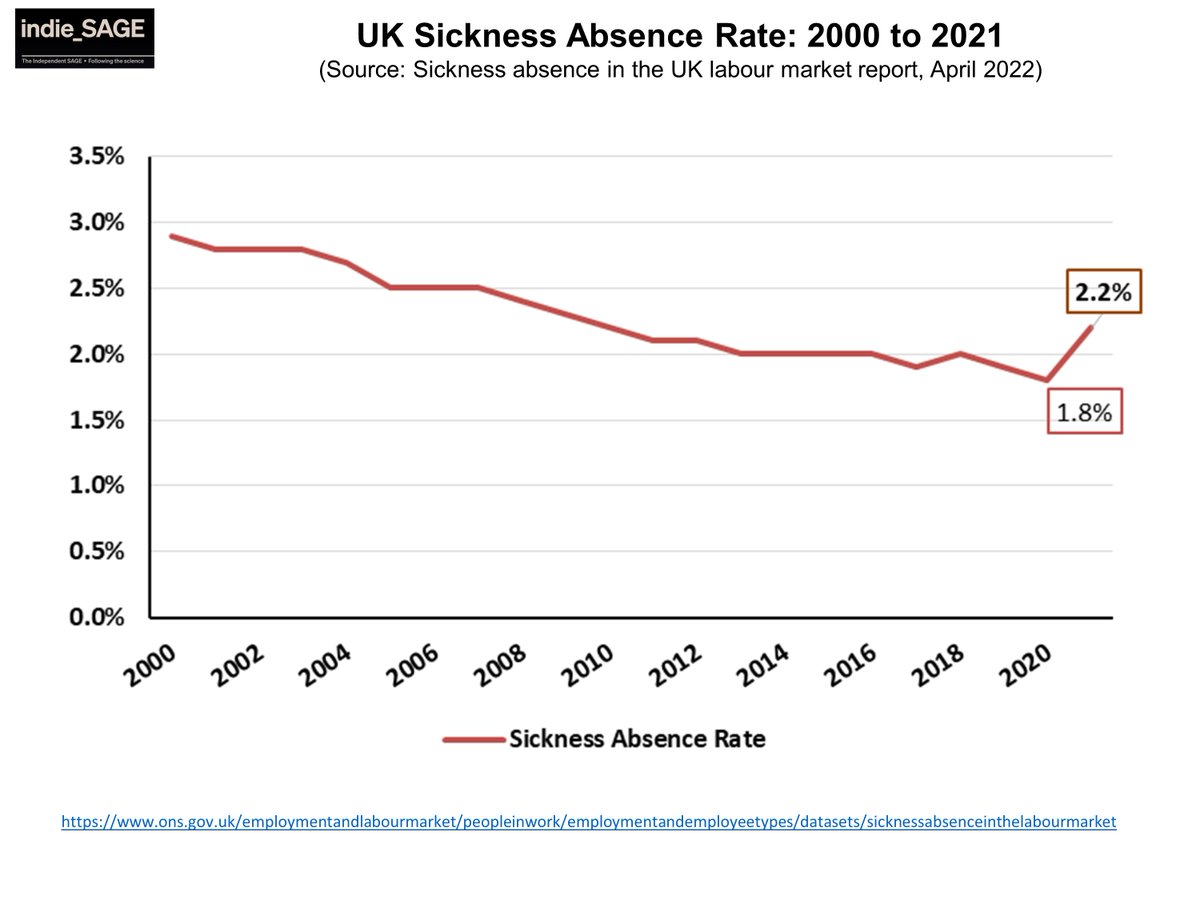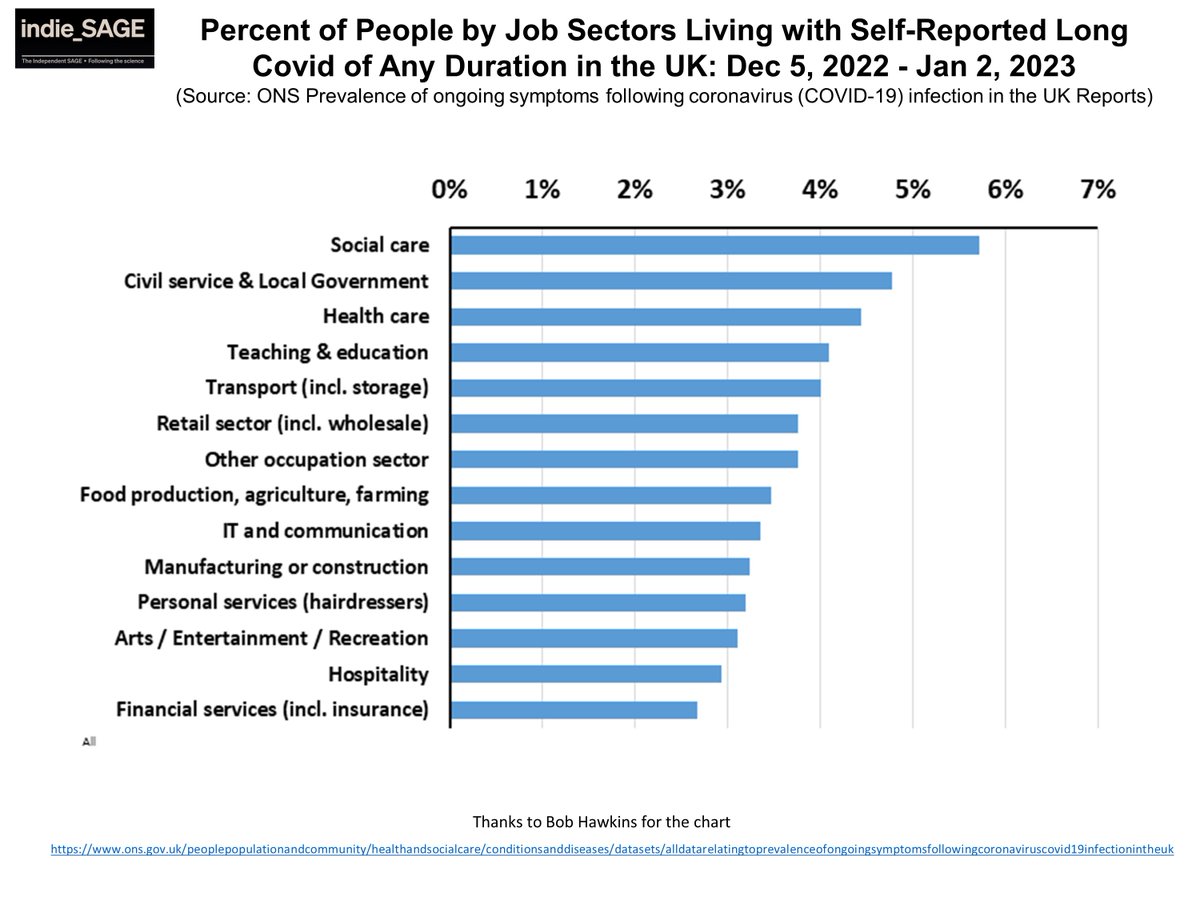Apparently the government are planning to tell doctor's to "sign fewer patients off sick" to reinvigorate the economy.
Unfortunately, just telling people they are not sick, doesn't make them not sick, so I think this plan will probably fail.
Lets have a look at the data.
🧵
1/12
Unfortunately, just telling people they are not sick, doesn't make them not sick, so I think this plan will probably fail.
Lets have a look at the data.
🧵
1/12

Firstly, we saw a sharp rise in the UK sickness absence rate from 2020 to 2021*.
This is the highest level since 2009.
*2022 data is not out until April.
2/12
This is the highest level since 2009.
*2022 data is not out until April.
2/12

The pandemic has had a number of different and potentially conflicting impacts on these data.
It's possible that measures such as furloughing, social distancing, shielding and increased homeworking may to have helped reduce other causes of absence in 2020...
3/12
It's possible that measures such as furloughing, social distancing, shielding and increased homeworking may to have helped reduce other causes of absence in 2020...
3/12
However, a large part of the uptick we saw in 2021 was undoubtedly due to covid.
The return to pre-pandemic working patterns and the cumulative impact of millions of covid infections have taken their toll.
You can clearly see rises in every age group in 2021.
4/12
The return to pre-pandemic working patterns and the cumulative impact of millions of covid infections have taken their toll.
You can clearly see rises in every age group in 2021.
4/12

If you look at the industries that had the highest sickness absence rate, you can to see "Human health and social work" right at the top, followed by "transport and storage".
These are two industries (particularly the first) highly likely to be impacted by covid.
5/12
These are two industries (particularly the first) highly likely to be impacted by covid.
5/12

If you look at the main reasons people were off work unwell in 2021, COVID is the first single identified reason (second behind the cumulative total of "other").
6/12
6/12

Even in 2020 (grey bars) - despite only being recorded for 3/4 of the year and the suppression measures we underwent - covid was still the fourth most common reason for being sick off work.
7/12
7/12

We know large numbers of people have been off on long term sick leave with Long Covid.
Again, it's not surprising to see Social care, Health Care, Education and Transport near the top of the list of sectors affected.
8/12
Again, it's not surprising to see Social care, Health Care, Education and Transport near the top of the list of sectors affected.
8/12

Large proportions of these people off sick with long covid find that it is limiting their activity either a little (orange) or a lot (red).
Is it going to help to deprive people of a fit note if they are not able to do their job?
I would suggest, not.
9/12
Is it going to help to deprive people of a fit note if they are not able to do their job?
I would suggest, not.
9/12

If we really want to do something about tackling workforce absence then one thing we could try is reducing the number of people who are getting sick with covid.
Here's a bunch of ways we might go about doing that (ventilation, filtration, masks...)
10/12
theconversation.com/covid-treatmen…
Here's a bunch of ways we might go about doing that (ventilation, filtration, masks...)
10/12
theconversation.com/covid-treatmen…
Another thing we might think about doing is improving sick pay so that people of the UK are allowed the requisite time they need to recover (and not to infect others with e.g. covid).
We rank a long way behind many of the European countries we might compare ourselves to.
11/12
We rank a long way behind many of the European countries we might compare ourselves to.
11/12

It's certain that we have a problem with sickness absence.
In Nov. former Chief Economist at the BofE Andrew Haldane warned of the economic consequences of an unhealthy population.
Forcing unwell people back to work isn't the answer to the problem.
\ENDS
health.org.uk/about-the-heal…
In Nov. former Chief Economist at the BofE Andrew Haldane warned of the economic consequences of an unhealthy population.
Forcing unwell people back to work isn't the answer to the problem.
\ENDS
health.org.uk/about-the-heal…
With thanks, as always, to Bob Hawkins, for his help preparing the data.
• • •
Missing some Tweet in this thread? You can try to
force a refresh




